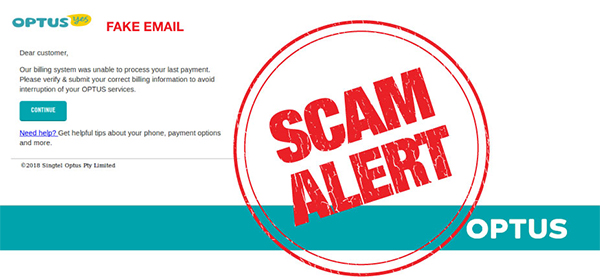Emails claiming to be from Optus are attempting to trick unsuspecting Australians into providing their credit card information to pay a supposedly unpaid bill.
A scam alert issued on Monday by the Australian Communications and Media Authority (ACMA) warns it has been receiving reports about emails with the subject line – ‘We are unable to process your last payment’.
The fake emails are sophisticated and use a web address that looks like the real Optus website.
The email contains a link to a fake ‘pay your bill’ page, which then asks for your credit card details.
The fake email and payment form are cunningly crafted to trick people.
“It’s important you check the legitimacy of email links to protect your personal information –use contact details you find through a legitimate source and not those contained in the suspicious message,” ACMA advises.
If you receive this email, ACMA is advising people to delete it immediately.
The Federal Government’s Stay Smart Online initiative offers this advice on the best ways to protect yourself from malicious email messages:
- Don’t open messages if you don’t know the sender, or if you’re not expecting them.
- Be suspicious of messages that aren’t addressed directly to you, or don’t use your correct name.
- Don’t reply to or forward chain letters you receive by email.
- Think carefully before clicking on any links or opening any attachments.
- If a message seems suspicious, contact the person or business separately to check if they are likely to have sent the message. Use contact details you find through a legitimate source and not those contained in the suspicious message. Ask them to describe what the attachment or link is.
- Before you click on a link (in an email or on social media, instant messages, other webpages, or other means), hover over that link to see the actual web address it will take you to (usually shown at the bottom of the browser window). If you do not recognise or trust the address, try searching for relevant key terms in a web browser. This way you can find the article, video or webpage without directly clicking on the suspicious link.
- Ensure you have up-to-date anti-virus software installed on any device used to access email.
Have you ever been fooled by a scam? What happened?
Related articles:
How to delete a saved password
Never get lazy with your data
How to fight online identity theft

